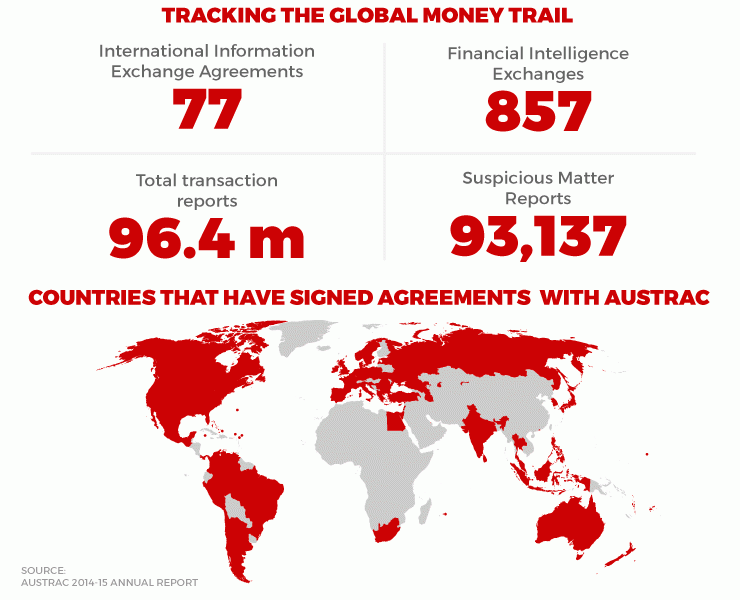Panama highlights weak links


The Federal government is under pressure to rein in international tax cheats, but Australia’s financial information sharing agreements with many countries don’t seem to be producing results.
Despite having memorandums of understanding (MOUs) with more than 70 countries, it appears the information flow to Australian regulators such as the Tax Office and the Australian Transactions Reports and Analysis Centre (Austrac) has been lacking.
In particular, Austrac has long-standing agreements to share information with the Financial Investigations Agency in the British Virgin Islands (BVI) and Panama’s Unidad de Analisis Financiero, two countries at the centre of the Panama Papers storm.
• Aussie pollies flat-footed in Panama scandal
• Why the Panama Papers matter
• The ‘tax heaven’ tempting Australians online
The New Daily asked both Austrac and the ATO to provide details on their offshore information sharing, such as a country-by-country breakdown of the number of information reports.
In addition, the ATO was also asked for an update on “Project Eclipse”, which was set up in 2013 to track Australians hiding their income and assets offshore using complex offshore structures in jurisdictions including Singapore, the BVI, Cayman Islands, and the Cook Islands. This followed the acquisition of database with the US and UK that included more than two million documents relating to thousands of people worldwide.
“Due to confidentiality provisions in the Tax Act the ATO is unable to comment on any individual’s or entity’s tax affairs,” the ATO responded.
Austrac did not provide any response.
The money-tracking authority detailed in its 2014-15 annual report that it had received 857 financial intelligence exchanges over that year, but the report excluded further details of those exchanges.
“The MOUs are a key tool in combating global crimes and protecting the integrity of Australia’s financial system,” Austrac states on its website.
“Co-operation is needed between financial intelligence units and law enforcement in a range of countries because criminals – involved in money laundering, terrorism, tax evasion drug trafficking and other serious and organised crimes – do not respect borders.”
Government remains tight-lipped
Assistant treasurer Kelly O’Dwyer was unavailable for comment, while a spokesman for the ATO said no further comment would be made beyond those made on Monday by ATO deputy commissioner Michael Cranston. He revealed earlier in the week that more than 800 Australian taxpayers were now being investigated, with 120 linked to an offshore service provider in Hong Kong.
“We have been analysing the latest data against information these taxpayers had reported to the ATO and against the information we already have,” Mr Cranston said.
“We are also working closely with the AFP, Australian Crime Commission and Austrac to further cross-check the data and strengthen our intelligence. Some cases may be referred to the Serious Financial Crime Taskforce.”
Shadow assistant treasurer, Andrew Leigh, told The New Daily on Thursday that urgent action was required.

Labor’s Andrew Leigh says the government is dithering. AAP
“Like many Australians, I’ve been disgusted at the revelation that some of the world’s richest people have been using tax havens to avoid paying tax,” Mr Leigh said.
“In government, Labor led the way with a multi-billion dollar multinational tax package, which the Liberals voted against. In opposition, we’ve developed a $7.2 billion package, which the Liberals stubbornly refuse to legislate.
“While the Liberals dither, Labor will continue to look for ways to curtail the use of tax havens and make sure everyone pays their fair share of tax.”
Swinburne University adjunct professor Steve Worthington told The New Daily it was no surprise the Panama Papers scandal had hit the headlines.
“It just goes to show that people dodging the tax system do eventually get found out, and they should get found out,” he said.
Professor Worthington said that with a lot of nervousness about economic growth, particularly in developing countries, the scandal would focus attention on the huge sums of money being syphoned out by companies and individuals to evade tax.
“We are heading into an era of low economic growth and possibly onto another financial crisis,” Professor Worthington said. “This can only be solved by a global initiative by governments and authorities focused against tax evasion.”










